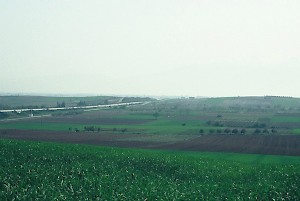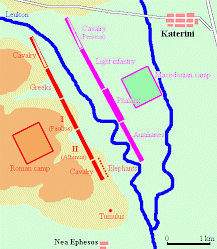Pydna (168 BCE)
Q504739Battle of Pydna: Rome's decisive victory in the Third Macedonian War (168 BCE)
The following account of the battle of Pydna, which took place on 22 June 168 BCE, was written by the Roman historian Livy, who uses as his source Polybius of Megalopolis, a contemporary of the events who wrote a (partly lost) World History. The translation of Livy's History of Rome since its Foundation 44.40-42 was made by Rev. Canon Roberts.
***

There was a river, not a large one, near the enemy's camp from which both the Romans and the Macedonians drew their water, protected by detachments stationed on either bank. [...] Whilst all was quiet at the river, neither side offering any provocation, a mule broke loose about three o'clock in the afternoon from the men in charge and escaped to the opposite bank. Three soldiers went after it through the water, which was up to their knees. Two Thracians [from the Macedonian army] were dragging the beast out of the river back to their own bank, when they were followed by some Romans, who killed one of them, recaptured the mule, and went back to their posts.
There were 800 Thracians guarding the enemy's bank. A few of these, enraged at seeing a comrade killed before their eyes, ran across the river in pursuit of those who slew him; then more joined in and at last the whole body, and with them the ...
[At this place, there is a large lacuna, in which Livy must have described how the skirmish increased in seriousness. One contingent of Roman allies, the Paelignians, suffered heavily. King Perseus now ordered his army to prepare for battle. The Romans were already prepared.]
... led them into battle. His men were deeply impressed by reverence for his authority, the reputation he had acquired, and, above all, his age, for though more than sixty years old, he took upon himself to a large extent the duties and dangers which are usually the lot of younger men.

The interval between the caetrati [light armed infantry] and the divisions of the phalanx was filled up by the legion, and thus the enemy's line was interrupted. The caetrati were in their rear; the legion were fronting the shieldmen of the phalanx [...]. Lucius [Postumius] Albinus, an ex-consul, was ordered to lead the second legion against the phalanx [...]; these formed the center of the enemy's line.
On the Roman right, where the battle had begun, close to the river, he brought up the elephants and the cohorts of allied troops. It was here that the Macedonians first gave ground. For just as most new devices amongst men seem valuable as far as words go, but when they are put to a practical test and have to be acted upon they fail to produce results, so it was with the elephants; those of the Macedonians were of no use whatever. The contingents of the Latin allies followed up the charge of the elephants and repulsed the left wing. The second legion which had been sent against the center broke up the phalanx.
The most probable explanation of the victory is that several separate engagements were going on all over the field, which first shook the phalanx out of its formation and then broke it up. As long as it was compact, its front bristling with leveled spears, its strength was irresistible. If by attacking them at various points you compel them to bring round their spears, which owing to their length and weight are cumbersome and unwieldy, they become a confused and involved mass, but if any sudden and tumultuous attack is made on their flank or rear, they go to pieces like a falling house. In this way they were forced to meet the repeated charges of small bodies of Roman troops with their front dislocated in many places, and wherever there were gaps the Romans worked their way amongst their ranks. If the whole line had made a general charge against the phalanx while still unbroken, as the Paeligni did at the beginning of the action against the caetrati, they would have spitted themselves upon their spears and have been powerless against their massed attack.
The infantry were being slaughtered all over the field; only those who threw away their arms were able to make good their escape. The cavalry, on the other hand, quitted the field with hardly any loss, the king himself being the first to flee. He was already on his way to [the Macedonian capital] Pella with his "sacred" cavalry, and [the Thracian king] Cotys and his Odrysaeans were following at his heels. The rest of the Macedonian horse also got away with their ranks unbroken, because the infantry were between them and the enemy, and the latter were so fully occupied in massacring the infantry that they forgot to pursue the cavalry.
For a long time the slaughter of the phalanx went on in front, flank and rear. At last those who had escaped out of the hands of the enemy threw away their arms and fled to the shore; some even went into the water and, stretching out their hands in supplication to the men in the fleet, implored them to save their lives. When they saw boats from all the ships rowing to the place where they were they thought that they were coming to take them up as prisoners rather than slay them, and they waded further into the water, some even swimming. But when they found that they were being killed by the men in the boats, those who could swim back to land met with a more wretched fate, for the elephants, forced by their drivers to the water's edge, trampled on them and crushed them to death as they came out.
It is universally admitted that never had so many Macedonians been killed by the Romans in a single battle. As many as 20,000 men perished; 6000 who had fled to Pydna fell into the enemy's hands, and 5000 were made prisoners in their flight. Of the victors not more than 100 fell, and of these the majority were Paelignians; the wounded were much more numerous. If the battle had begun earlier and there had been sufficient daylight for the victors to continue the pursuit, the whole force would have been wiped out. As it was, the approach of night shielded the fugitives and made the Romans chary of following them over unknown country.